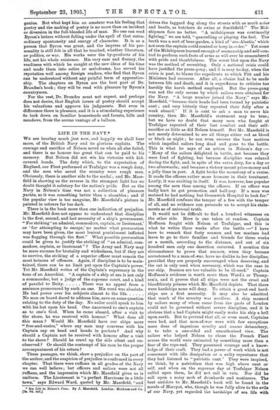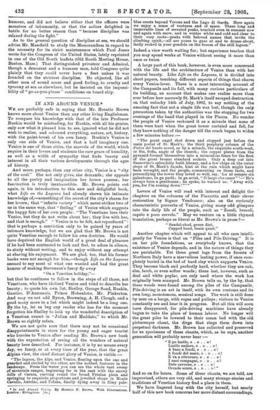WE are hearing much just now, and happily we shall
hear more, of the British Navy and its glorious exploits. The courage and sacrifice of Nelson saved us when all else failed, and there is no honour too great that can be paid to his memory. But Nelson did not win his victories with kid- -covered bands. The duty which, to the expectation of England, our Fleet performed at Trafalgar was a rough duty, .and the men who saved the country were rough men. Obviously, there is another side to the medal ; and Mr. Mase- field in showing us the reverse in the strongest light has no doubt thought it salutary for the nation's pride. But as the Navy in Nelson's time was not a collection of pleasure _yachts, so it was something better than a shambles ; and if the popular view is too sanguine, Mr. Masefield's picture is painted in colours far too dark.
There is in the book more than one indication of prejudice. Mr. Masefield does not appear to understand that discipline is the first, second, and last necessity of a ship's government. 4" For striking an admiral, commodore, captain, or lieutenant,' or`for attempting to escape,' no matter what provocation may have been given, the most lenient punishment inflicted was flogging through the fleet." What possible provocation could be given to justify the striking of " an admiral, com- modore, captain, or lieutenant" ? The Army and Navy may be mere excuses for brutality and wickedness, but if they are
o stirvive, the striking of a superior officer must remain the most heinous of offences. Again, if discipline is to be main- tained, there can be no limit put upon the Captain's power. Yet Mr. Masefield writes of the Captain's supremacy in the tone of an Anarchist. "A captain of a ship at sea is not only a commander, but a judge of the supreme court, and a kind of parallel to Deity There was no appeal from a sentence pronounced by such an one. His word was absolute.
He had power over his subjects almost to the life No man on board dared to address him, save on some question relating to the duty of the day. No sailor could speak to him with his bat upon his head. One uncovered to one's captain as to one's God. When he came aboard, after a visit to the shore, he was received with honour." What does all this mean ? Would Mr. Masefield have our ships mere free-and-easies," where any man may converse with his Captain cap on head and hands in pockets ? And why should a Captain not be received with honour after a visit to the shore ? Should he crawl up the side silent and un- observed ? Or should the contempt of his men be the proper accompaniment of his return?
These passages, we think, show a prejudice on the part of the author, and the suspicion of prejudice is confirmed in every chapter. That there were ruffians in all grades of the Navy we can well believe ; but officers and sailors were not all ruffians, and the impression which Mr. Masefield gives us is uniform. The Lieutenant is "a perfect Hurricane in a little town," says Edward Ward, quoted by Mr. Masefield, "and
• Sea Life in Nelson's Time. By J. Naaeftedd. Ps. 6d. net.]
drives the laggard dog along the streets with as much noise and bustle, as butchers do swine at Smithfield." The Mid- shipmen fare no better. " A midshipman was continually fighting," we are told, " quarrelling or playing the fool. The berth was a sort of bear-garden, a kind of sea-Alsatia,' which not even the captain could control or keep in order." Yet some of the Midshipmen learned enough of seamanship and self-con• trol to perform such feats of arms as will ever be remembered with pride and thankfulness. The worst blot upon the Navy was the method of recruiting. Only a national crisis could have justified the press-gang; and it is easy to-day, when the crisis is past, to blame the expedients to which Pitt and his Ministers had recourse. After all, a choice had to be made between life and death, and it is superfluous to criticise too harshly the harsh method employed. But the press-gang was not the only means by which sailors were obtained for the Navy. "A large number joined the Navy," says Mr. Masefield, " because their heads had been turned by patriotic cant ; and very bitterly they repented their folly after a week aboard." If it is cant to ask a man to serve his country, then Mr. Masefield's statement may be true ; but we have no doubt that many men who fought at Trafalgar repented of their lost comfort and their self- sacrifice as little as did Nelson himself. But Mr. Masefield is not merely determined to see all things either red as blood or black as night ; he can even recover the base motives which impelled sailors long dead and gone to the battle. This is what he says of an action in Nelson's day :— " Many of the sailors delighted in battle, not because they were fond of fighting, but because discipline was relaxed during the fight, and, in spite of the extra duty, for a day or two afterwards ; and because a victory meant prize-money and a jolly time in port. A fight broke the monotony of a cruise. It made the officers rather more humane in their treatment. Lastly, it was exciting in itself. It was, however, less popular among the men than among the officers. If an officer was badly hurt he got promotion and half-pay. If a man was maimed he had nothing but Greenwich Hospital to look for." Mr. Masefield confuses the temper of a few with the temper of all, and no evidence can persuade us to accept his state- ments as of universal truth.
It would not be difficult to find a hundred witnesses on the other side. Here is one taken at random. Captain Hoffman fought with Nelson at Trafalgar, and this is what he writes three weeks after the battle :—" I have here to remark that forty seamen and ten marines had leave to go to their families and friends for three weeks or a month, according to the distance, and out of six hundred men only one desertion occurred. I mention this circumstance to prove that seamen, when they become accustomed to a man-of-war, have no dislike to her discipline, provided they are properly encouraged when deserving, and the cat is only used when necessary, which was the case in our ship. Seamen are too valuable to be ill-used." Captain Hoffman's evidence is worth more than Ward's or Thomp- son's, and it proves that all ships were not the cruel and bloodthirsty prisons which Mr. Masefield depicts. That there were hardships none will deny. To attain a great end hard- ships are a first necessity. It may also be admitted that much of the severity was needless. A ship manned by sailors many of whom came from the gaols of London could not be governed without severe discipline, and it is obvious that a bad Captain might easily make his ship a hell upon earth. But to pretend that all, or even most, Captains were bad, and that men-of-war were with few exceptions mere dens of ingenious cruelty and coarse debauchery, is to take a one-aided and unauthorised view. The sailors who helped Nelson to chase the French Fleet across the world were animated by something more than a fear of the rope-end. They possessed courage and a know. ledge of their craft. They had a power of work which is not consonant with idle dissipation or a sulky repentance that they had listened to " patriotic cant." They were inspired, we think, by a patriotism that was high above cant or self, and when on the supreme day at Trafalgar Nelson called upon them, he did not call in vain. Nor did he call upon a noisy mob of drunkards and mutineers. The best antidote to Mr. Masefield's book will be found in the
of our Navy, yet regarded the hardships of sea life with
London: Methuen and Co. novels of Marryat, who, though he was fully alive to the evils
As to the general question of discipline at sea, we should advise Mr. Masefield to study the Memorandum in regard to the necessity for its strict maintenance which Paul Jones wrote for the Congress of the United States, lately reprinted in one of the Old South leaflets (Old South Meeting House, Boston, Mass.) That distinguished privateer and Admiral, though a democrat and a humane man, told Congress quite plainly that they could never have a fleet unless it was founded on the strictest discipline. He objected, like all other men of sound sense and good feeling, to cruelty and tyranny at sea as elsewhere, but he insisted on the impossi- bility of " go-as-you-please " conditions on board ship.
IN AND AROUND VENICE.*











































 Previous page
Previous page